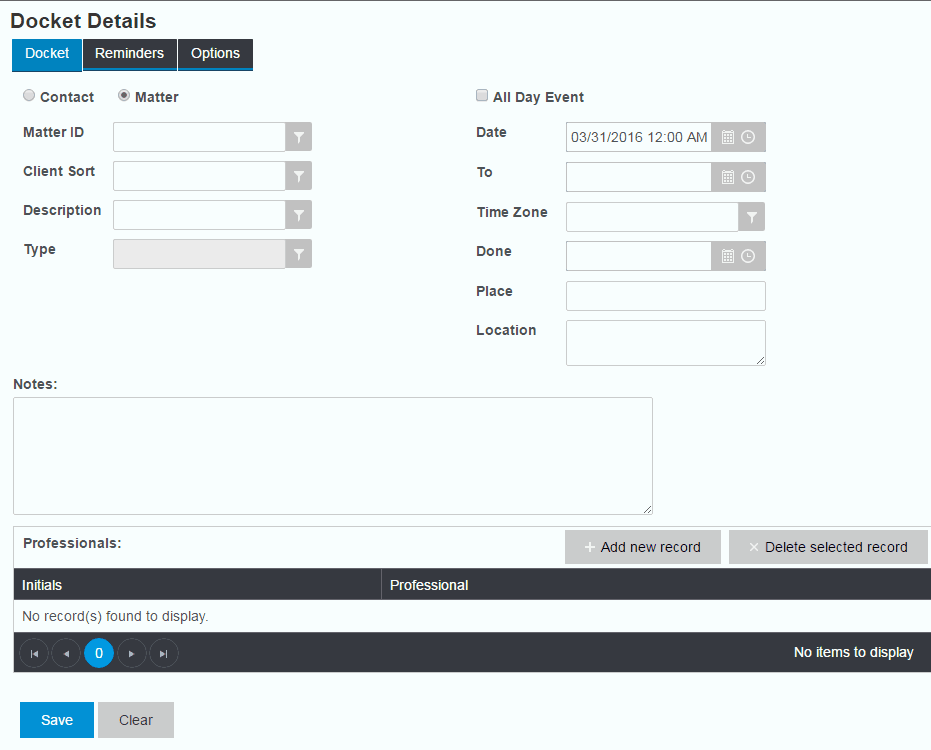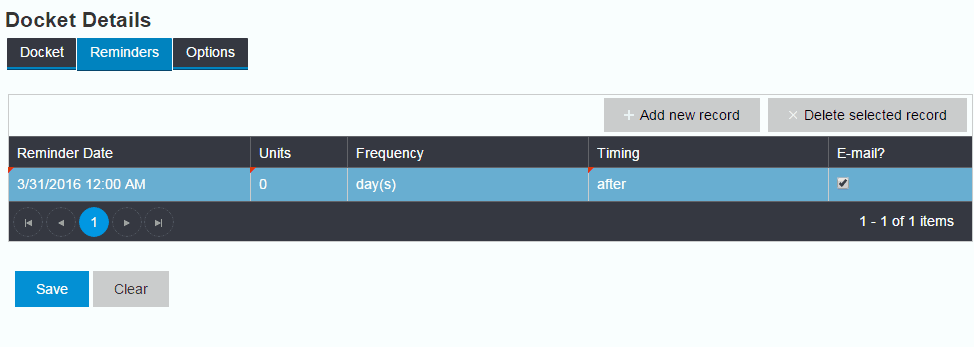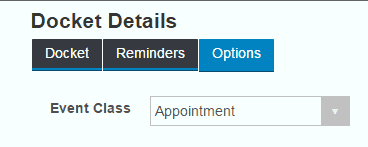
Use the Docket Details page to view the details of a docket event. All of the fields on the Docket Details page are read-only.
The following is the standard Docket Details page.

The following fields display on the Docket Details page.
|
Field |
Description |
|
Docket Tab |
|
|
Contact or Matter |
Select whether the docket event is to be saved to a contact or a matter. |
|
Matter ID/Client Sort/Description (if the Matter radio button is selected) |
Enter or search for a Matter ID or Client Sort. If the Matter ID field is completed first, the Client Sort and Description fields are completed automatically. If the Client Sort field is completed first, the Matter ID and Description fields are completed automatically. If the Description field is completed first, the Matter ID and Client Sort fields are completed automatically. |
|
Company/Full Name (if the Contact radio button is selected) |
Specify the Contact by entering (or searching for) a Company or Full Name. If the Company field is completed first, the Full Name field is completed automatically. If the Full Name field is completed first, the Company field is completed automatically. |
|
Type |
The type of docket event. Disabled until a matter/contact is selected. |
|
All Day Event |
Select this check box if the event lasts the entire day. If this check box is selected, the To field is disabled. |
|
Date |
The date and time the docket item starts. This field can be changed. |
|
To |
The date and time the docket item is scheduled to end. This field can be changed. |
|
Time Zone |
Enter or select the time zone in which the docket event occurs. |
|
Done |
When the docket is complete, fill in the "done" field with the appropriate date or select the date from the calendar. This will mark it as complete and can exclude it from being listed on the tree or returned in queries. Note: The "done" date is different from the "to" date: The "to" date is when the event is scheduled to be completed; the "done" date is when it is actually completed. |
|
Place |
Typically the building or room in which an event occurs. This field can be changed. |
|
Location |
More detailed information about the locale of the event. This field can be changed. |
|
Notes |
The contents of this field defaults to either the docket type or default notes as defined by the firm administrator. Notes can be changed as desired. The first line of the Notes field can be displayed in the event tree, if desired. |
|
Professionals Grid |
The individuals who will attend the event or who want it to display on their calendar. |
|
Reminders Tab |
|
|
Reminder Date |
Enter the date that the reminder will be sent. When a date is selected, ProLaw calculates the Units, Frequency and Timing fields. For example, if the docket event is on 9/30/16, and "09/23/16" is selected as the Reminder Date, then "1" displays in the Units field, "week(s)" displays in the Frequency field, and "before" displays in the Timing field. This field can be changed. |
|
Units |
This field displays the number of units for the reminder. This field works in conjunction with the Frequency and Timing fields. For example, if "2" displays in this field, "day(s)" displays in the Frequency field, and "before" displays in the Timing field, then the reminder will be sent two days before the date of the docket event. This field can be changed. |
|
Frequency |
This field indicates how the time period before or after the docket event is measured. It indicates whether the reminder is sent minutes, hours, days, business days, weeks, months or years before or after the docket event. This field can be changed. |
|
Timing |
This field indicates whether the reminder is sent before or after the docket event. This field can be changed. |
|
E-mail? |
Select this check box to send an e-mail reminder. |
Use this tab to set reminders.
ProLaw will calculate the dates and send an e-mail alert if selected.

Reminders can be set up on the docket type level, and when the docket itself is created they can be changed, deleted, or new ones added.

|
Field |
Description |
|
Event Class |
Event classes help to organize events within the Event window. For example, different docket events can be assigned to the event class Depositions. Some suggestions include large event class groupings such as Complaint, Motions, Discovery, Depositions and Filings. |
See also: